Conclusions from E3 Harelbeke and Gent-Wevelgem
Pointers for Flanders from the weekend's racing
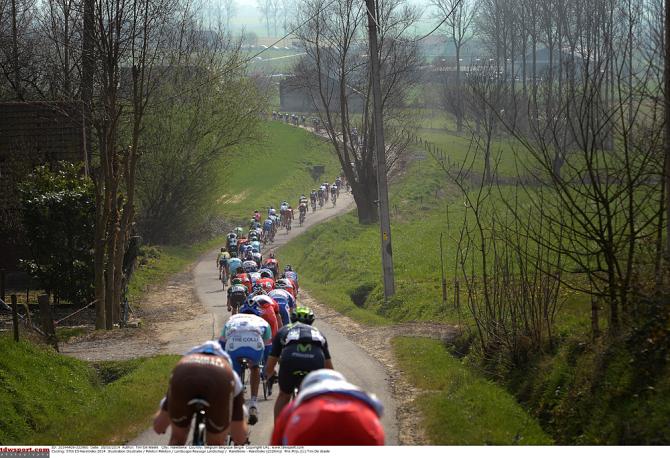
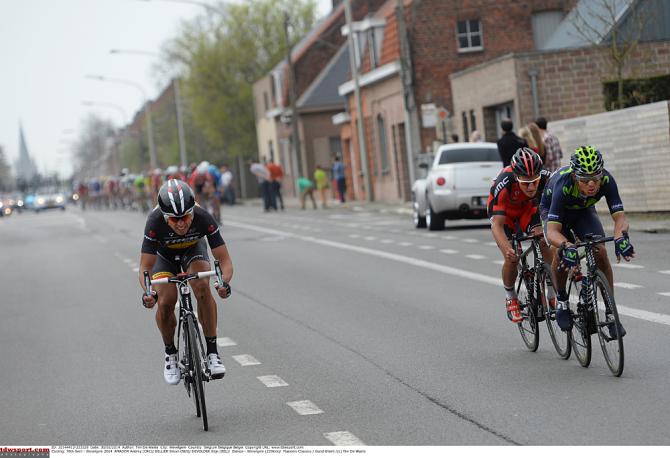
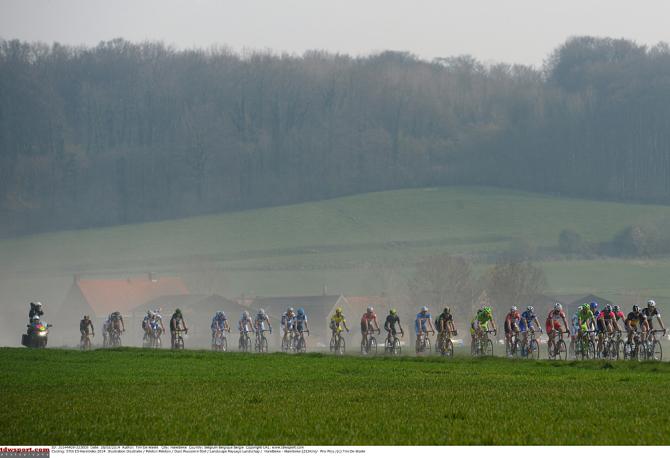
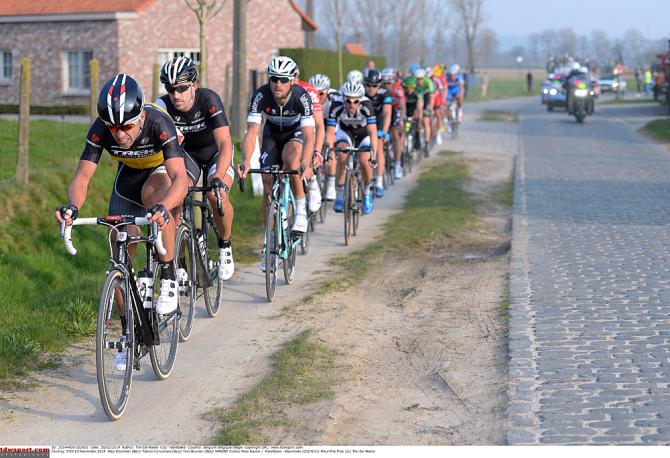
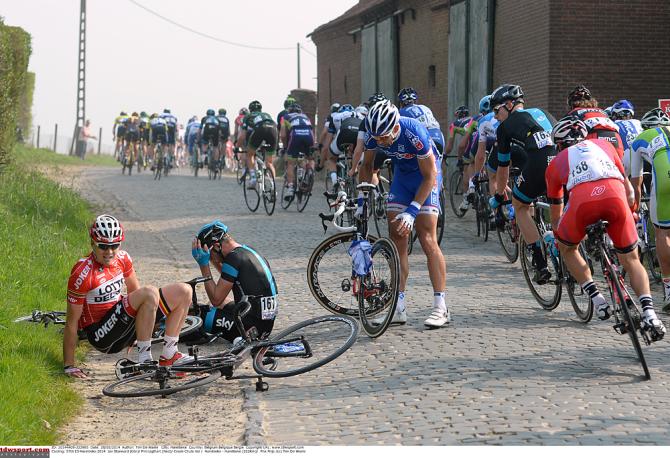
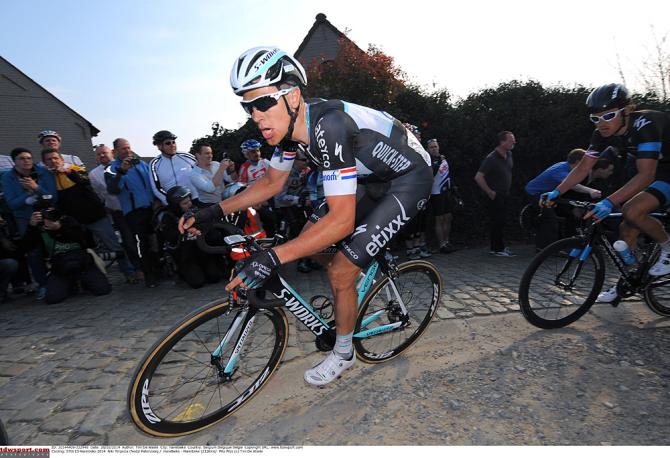
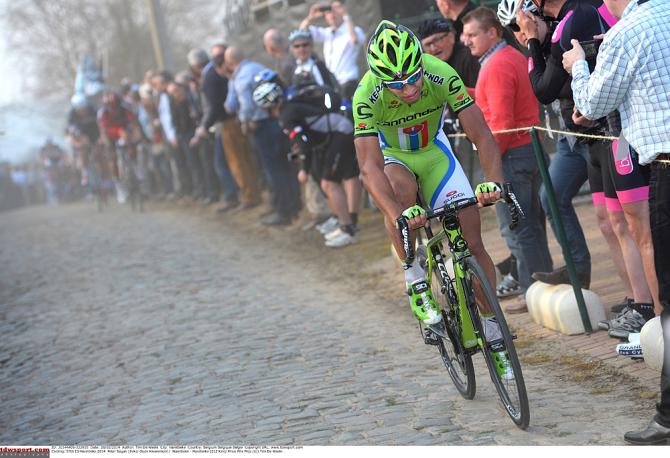
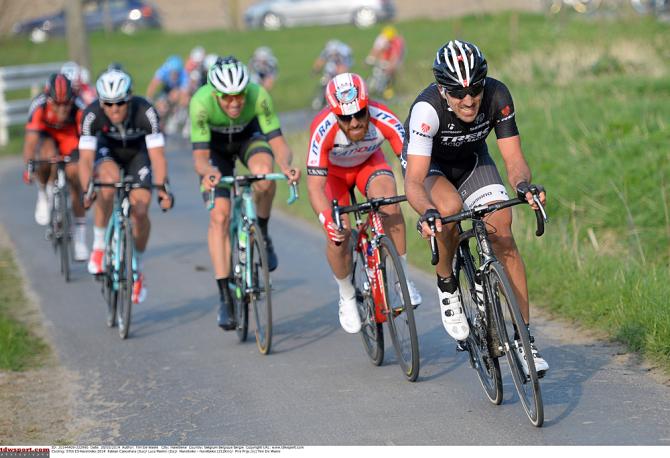
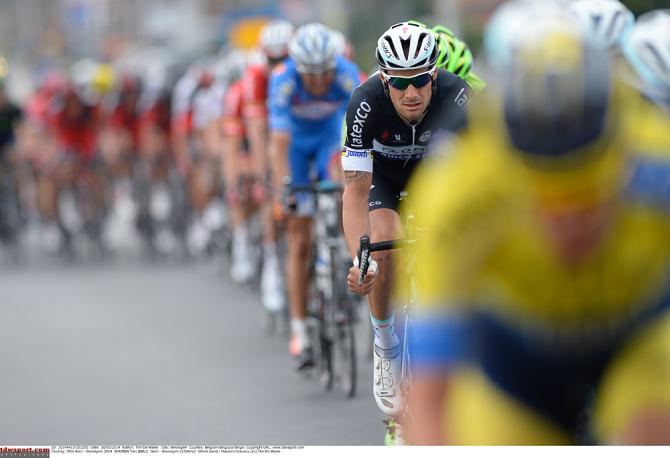
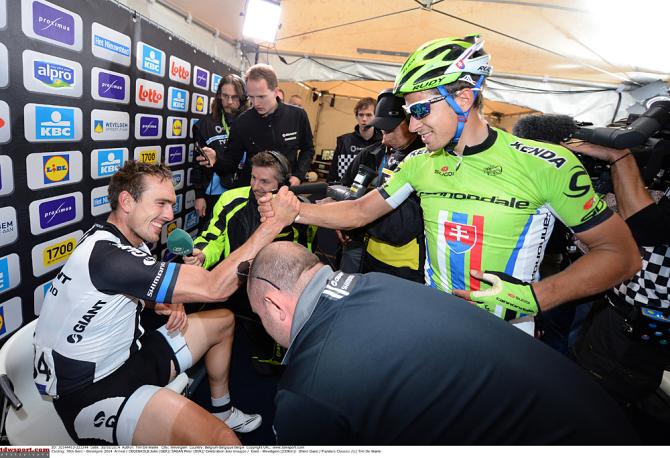
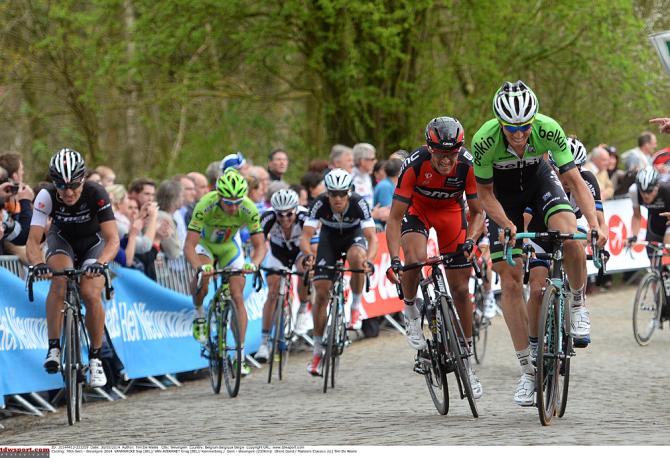
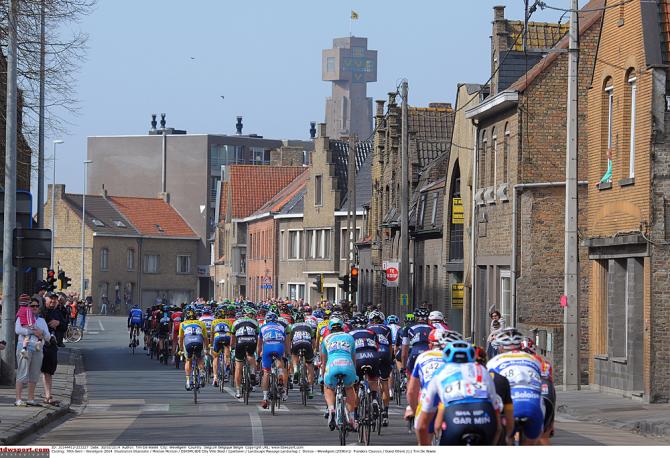
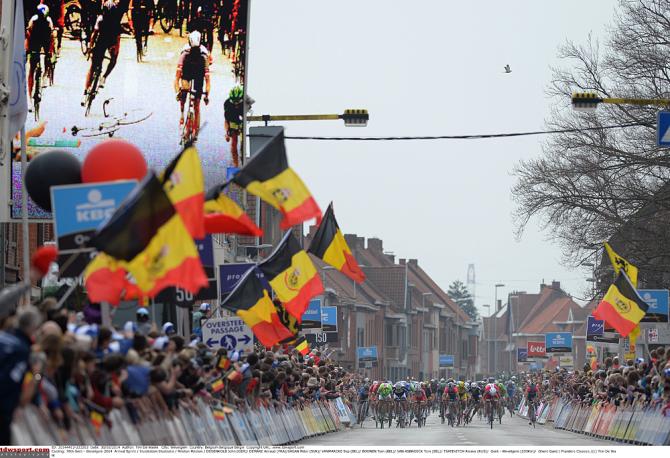
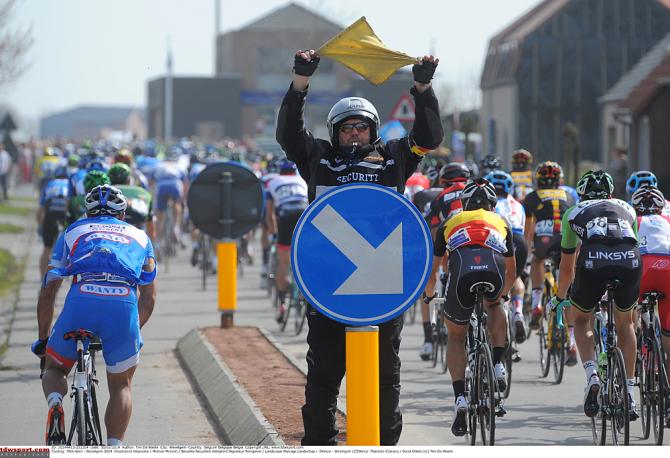
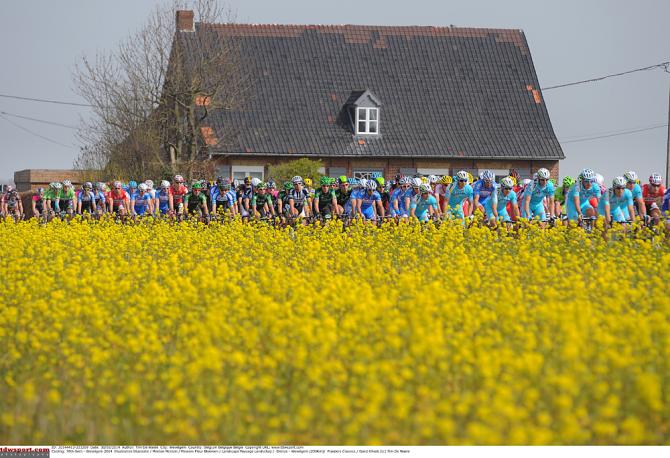
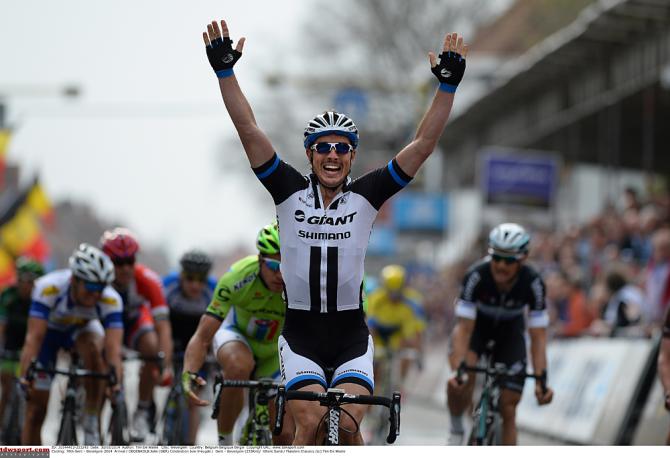
No obvious favourite for the Tour of Flanders
For the first time since the calendar was restructured in 2010 and Gent-Wevelgem moved to its current, pre-Tour of Flanders slot, the E3 Harelbeke/Gent-Wevelgem doubleheader has failed to highlight a single, outstanding favourite for De Ronde.
Fabian Cancellara's victories at E3 Harelbeke in 2010, 2011 and 2013 made his odds prohibitively short for the Tour of Flanders – although heavy marking left him frustrated in 2011 – while Tom Boonen's smart double at Harelbeke and Gent-Wevelgem in 2012 prefigured his record-equalling Flanders and Paris-Roubaix wins on the next two Sundays.
This year, Peter Sagan is the man who comes away the happiest with his weekend's work after landing a canny win at Harelbeke and a third place finish in Wevelgem, but although he is undoubtedly in the very top echelon of Ronde contenders, he hasn't placed himself head and shoulders above his rivals either.
Meanwhile, Cancellara's Harelbeke challenge was ruined when he was caught behind a crash before the Paterberg, but he showcased his strength with a dramatic chase effort. Hampered by a thumb injury, Boonen appeared less at ease on Friday, but felt he was back on track on Sunday, and reckoned that he could have won by more than a bike length if he hadn't been blocked in the final sprint.
The troika of main contenders, then, appear to be there or thereabouts, but none of them will feel intimidated by what the others produced at Harelbeke and Gent-Wevelgem. The bookmakers have Cancellara listed as the slight favourite, ahead of Sagan and Boonen, but with the likes of Sep Vanmarcke (Belkin) and Niki Terpstra (Omega Pharma-QuickStep) also showing signs of form – and, just as importantly, self-belief – it promises to be a very finely-balanced edition of the Ronde.
Trek and QuickStep's second line
Get The Leadout Newsletter
The latest race content, interviews, features, reviews and expert buying guides, direct to your inbox!
Peter Sagan may be the man most likely to break up the Boonen-Cancellara duopoly in the cobbled classics, but it’s worth noting that in the sixteen editions of the Tour of Flanders and Paris-Roubaix since 2005, victory has fallen to Boonen, Cancellara or one of their teammates on all but three occasions – Alessandro Ballan (Flanders 2007), Nick Nuyens (Flanders 2011) and Johan Vansummeren (Paris-Roubaix 2011) are the exceptions. In that context – and particularly if Boonen and Cancellara cancel one another out – the second line at both Trek and Omega Pharma-Quick Step could have a golden opportunity next Sunday.
In 2008 and 2009, Stijn Devolder took advantage of being Boonen's foil at QuickStep to land back-to-back Ronde victories, and the great enigma of Belgian cycling looks to be reaching boiling point at just the right time. Now Cancellara's right hand man at Trek, Devolder went on the offensive in the finale of both Dwars door Vlaanderen and Gent-Wevelgem. "I feel I'm ready for the Tour of Flanders," Devolder told reporters at the finish on Sunday, before pushing his way through the scrum to motor-pace home behind his father's scooter.
Over at Omega Pharma-Quick Step, Niki Terpstra has become agitator-in-chief following the departure of Sylvain Chavanel, and the Dutchman was hugely impressive in winning Dwars door Vlaanderen on Wednesday. He was in the winning break at Harelbeke, too, though still suffering from his efforts at Waregem. Terpstra is almost certain to go up the road at De Ronde; in the right circumstances, he could follow in the tracks of Devolder in 2008 and 2009.
Unnecessary risks?
Commenting on crashes in a Belgian race seems almost as redundant as decrying punctures in the Arenberg forest or rain at the Three Days of De Panne, but even by traditional standards, there seemed to be an unusually high number of incidents at E3 Harelbeke and Gent-Wevelgem.
Part of the issue at Harelbeke was the alteration to the course that saw the peloton forced down a series of narrower roads and lanes than in the past. "For doing a race like this, I don't know if this is the good direction to go," Cancellara noted after he was caught behind a crash before the Paterberg. At Gent-Wevelgem, however, it seemed simply that some riders were taking undue risks in the peloton, and the long, long list of crash victims included Ian Stannard, Geraint Thomas, André Greipel, Tyler Farrar and Fran Ventoso.
BMC's Klaas Lodewyck blamed the UCI WorldTour points system for the crashes, telling Sporza: "The mentality is changing within the peloton. WorldTour points are too valuable. Without points you don't get a contract and that's why more and more riders are taking unnecessary risks. The system is not right." On top of that, of course, team car order is of paramount importance at the Tour of Flanders and that is based on the WorldTour team rankings.
Ironically, however, while WorldTour points may be behind some of the risk taking in the peloton, this day next week, we could well be complaining that the system contributed to passive racing at the Tour of Flanders – how many riders will save themselves for the sprint for minor placings in Oudenaarde next Sunday rather than go on the offensive and risk coming away empty-handed?
Keep off the pavement?
After controversy at Kuurne-Brussel-Kuurne, the UCI's new directive that riders are "strictly prohibited to use sidewalks/pavements, paths or cycle paths" continues to cause confusion. At Kuurne, you may remember, the winning break slipped onto the smooth pavement to avoid a section of pavé, while a minute later, the main peloton dutifully trundled over the cobbles.
With that in mind, Filippo Pozzato told Cyclingnews that he had asked the commissaires for clarification before E3 Harelbeke, only to receive a decidedly ambiguous response. According to Pozzato, if a lone rider used the pavement, then he would be punished, but if a majority of riders did so, then the commissaires would turn a blind eye. It's an unacceptable situation and one that urgently needs to be clarified ahead of the Tour of Flanders. Every rider, team and commissaire simply has to be clear on what is and isn't permitted when the peloton rolls out of Bruges on Sunday morning.
Sagan's canny win
Peter Sagan faced some robust criticism after his 10th place finish at Milan-San Remo – as Cannondale manager Roberto Amadio noted dryly, it seems Sagan can now only lose races rather than win them – but he responded in resolute fashion with victory at E3 Harelbeke and third place at Gent-Wevelgem.
By his own admission, Sagan was not at his best in the finale on Friday. After riding 40 kilometres on teammate Alan Marangoni's bike and spending much of the middle section of the race chasing back on, Sagan was initially unable to follow Geraint Thomas, Terpstra and John Degenkolb on the Kwaremont, but he carefully measured his effort to catch them on the descent. In the finale, mindful of Degenkolb's finishing speed, Sagan lifted the pace just enough at the top of the Karnemelkbeekstraat to drop the German, and even though outnumbered by Quick Step riders in the winning break, he made no mistake in the four-up sprint.
Sagan's physical qualities have never been in doubt, but in the past, he has made some questionable tactical decisions on the cobbles. Blessed with an array of talents, Sagan has often appeared unsure as to whether to track the moves or save himself for a sprint in the finale of big classics, but on Friday, he struck the perfect balance to claim arguably the most impressive triumph of his career. It's hard to tell if Sagan is quite at the same effervescent level of this time twelve months ago, but if he rides as cleverly as he did at Harelbeke, then he might not need to be.
Dashboard cameras
Innovations in cycling are rarely universally welcomed – see the furore over radio earpieces, the Tour of Beijing and the Pompeiana – but it's hard to find fault with Sporza's installation of dashboard cameras in selected team cars at Gent-Wevelgem on Sunday. It's a reprise of an experiment from their coverage of the 2011 Tour of Flanders – when Wilfried Peeters memorably protested to Leopard Trek that "your boy's too strong" when refusing to allow Sylvain Chavanel ride with Cancellara – and it made for a fine addition to our enjoyment of the race.
Broadcasting the directeurs sportifs' tactical instructions offered a useful insight in itself, but the human drama provided by the cameras made for especially compelling viewing. The look of resignation on Marc Sergeant’s face when André Greipel crashed was superseded only by the existential bleakness of the German's own expression when he sat into the team car. The later sequence of Greipel cursing quietly as he watched Degenkolb's victory while an impassive Herman Frisson drove on wordlessly probably told us more about the sprinter than five years of guarded post-race interviews.
Sky getting closer to the mark
Back in February, Bernhard Eisel could only laugh when asked if Sky's classics unit has been unfairly criticised in recent years. "If you don't win Flanders or Roubaix, then you had a shit classics campaign," he said succinctly, pointing out that Fabian Cancellara and RadioShack apart, nobody could be happy with their 2013 showing.
Flanders and Roubaix, then, are the acid test for Sky, but the men in black look better-placed to perform there than they did this time twelve months ago, even if Ian Stannard's heavy fall at Gent-Wevelgem could yet see them robbed of perhaps their most outstanding candidate for a big win. The Englishman spent Sunday night in hospital and team doctor Phil Riley told Teamsky.com that, "Ian has a fracture in one of his vertebrae as a result of his fall."
Even so, Geraint Thomas looks on course to perform strongly at the Tour of Flanders after an impressive third place finish at E3 Harelbeke on Friday. The Welshman showed that he hadn’t been slowed by his Paris-Nice crash and he looked particularly comfortable on the Oude Kwaremont, matching the on-song Terpstra pedal stroke for pedal stroke. Beating Boonen and Cancellara has proved a tall order for all-comers over the past decade, but Thomas has quietly placed himself in the stratum of riders sitting below them.
The next generation
The road to classics victory seems set to run through Boonen and Cancellara for a while yet, but the mantle will inevitably be passed on in the next few years. Sagan's credentials didn't need any further highlighting, but his victory in Harelbeke, allied to John Degenkolb's win ahead of Arnaud Démare at Gent-Wevelgem, shows that an exciting generation of young classics talent is emerging.
Still only 25, Degenkolb already has inscribed Paris-Tours to his palmarès and but for a late puncture, he would have been in the shake-up for Milan-San Remo victory last weekend. Degenkolb was circumspect about his prospects at the Tour of Flanders, and it may well be a year too soon in his development, but none of the favourites will want to bring the German with them to the finish in Oudenaarde.
Démare is almost three years younger than Degenkolb and while he is perhaps not a realistic candidate for Ronde victory just yet, his sprint could carry him to a top 10 finish if he is still in the main group ahead of the final Kwaremont-Paterberg double.
Meanwhile, given the assurance of his performances in recent years, it's all too easy to forget that one of the bona fide candidates for victory in Oudenaarde, Sep Vanmarcke, is himself still only 25 years old. The softly-spoken Belkin man has looked very smooth indeed on the hellingen, but without the rewards his strength has perhaps deserved. Expect him to be a major factor next Sunday.

Barry Ryan was Head of Features at Cyclingnews. He has covered professional cycling since 2010, reporting from the Tour de France, Giro d’Italia and events from Argentina to Japan. His writing has appeared in The Independent, Procycling and Cycling Plus. He is the author of The Ascent: Sean Kelly, Stephen Roche and the Rise of Irish Cycling’s Golden Generation, published by Gill Books.